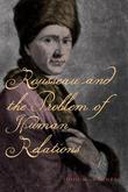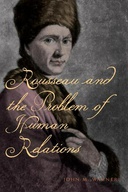Explore

Rousseau and the Problem of Human Relations
John M. Warner
2016
0 Ungluers have
Faved this Work
Login to Fave
Among Jean-Jacques Rousseau’s chief preoccupations was the problem of self-interest implicit in all social relationships. A person with divided loyalties (i.e., to both himself and his cohorts) was, in Rousseau’s thinking, a divided person. According to John Warner’s Rousseau and the Problem of Human Relations, not only did Rousseau never solve this problem, he believed it was fundamentally unsolvable: social relationships could never restore wholeness to a self-interested human being. Warner traces his argument through the contours of Rousseau’s thought on three distinct types of relationships—sexual love, friendship, and civil or political association. Warner concludes that none of these, whether examined individually or together, provides a satisfactory resolution to the problem of human dividedness located at the center of Rousseau’s thinking. In fact, concludes Warner, Rousseau’s failure to obtain anything hopeful from human associations is deliberate, self-conscious, and revelatory of a tragic conception of human relations. Thus Rousseau raises our hopes only to dash them.This title was made Open Access by libraries from around the world through Knowledge Unlatched.
This book is included in DOAB.
Why read this book? Have your say.
You must be logged in to comment.
Rights Information
Are you the author or publisher of this work? If so, you can claim it as yours by registering as an Unglue.it rights holder.Downloads
This work has been downloaded 605 times via unglue.it ebook links.
- 146 - pdf (CC BY-NC-ND) at OAPEN Library.
- 134 - pdf (CC BY-NC-ND) at Unglue.it.
- 100 - pdf (CC BY-NC-ND) at OAPEN Library.
- 138 - pdf (CC BY-NC-ND) at OAPEN Library.
Keywords
- Amour-propre
- Émile
- Humanities
- Interpersonal relations
- Jean-Jacques Rousseau
- KUnlatched
- or On Education
- Philosophy
- Political Science
- Politics
- Politics and social views
- Social & political philosophy
- thema EDItEUR::Q Philosophy and Religion::QD Philosophy::QDT Topics in philosophy::QDTS Social and political philosophy
- Thomas Hobbes
Links
DOI: 10.26530/OAPEN_605032Editions


